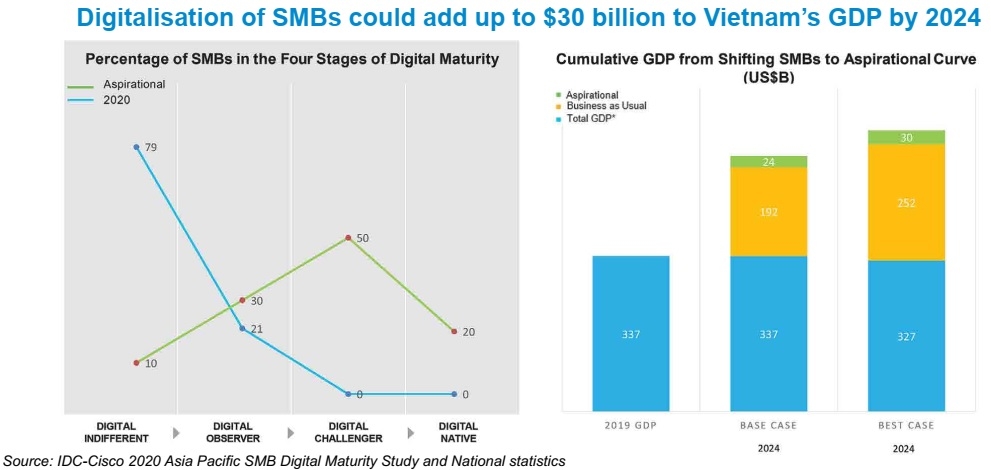Local SMEs plunge for digital moves
 |
| Local SMEs plunge for digital moves |
According to the recent Asia-Pacific SMB Digital Maturity Study by International Data Corporation about digitalisation across the region, 72 per cent of small- and medium-sized enterprises (SMEs) recognised that competition is becoming tougher and they must keep up with the pace, while 46 per cent of them say they are transforming due to demand by the customers.
Luong Thi Le Thuy, managing director of Cisco Vietnam, said that the digitalisation of SMEs in Vietnam could bring a huge benefit to their business and the country, possibly adding $24-30 billion to the country’s GDP by 2024 and contributing to economic recovery post-COVID-19.
“SMEs that are more digitally mature enjoy twice as many benefits in terms of revenue and productivity compared to those that have an indifferent approach to digitalisation,” Thuy said.
The results of the study also show that purchasing or upgrading IT hardware and investing in cloud technologies are the top investment priorities for SMEs in Vietnam with 18 per cent, followed by cybersecurity with 11 per cent.
In addition, the lack of a digital mindset, knowledge about necessary technologies, and insights into customer and operational data are the main challenges for Vietnam’s SMEs in digitalisation.
According to the General Statistics Office, SMEs form a large proportion of the domestic private sector and play a vital role in the Vietnamese economy, as they account for more than 95 per cent of all enterprises and contribute around 47 per cent of the country’s GDP.
Thuy stressed that despite the segment’s role as a key driver of Vietnam’s economic growth in recent years, it has been among the hardest hit by the COVID-19 pandemic.
“As Vietnam is working to overcome the current situation, and consumer and business activities start to pick up, the digital transformation of SMEs will play a pivotal role in their recovery and contribute to the country’s overall economic growth. At Cisco, we are committed to working with SMEs to help them emerge stronger with the right digital solutions and strategies,” Thuy said.
Raz Mohammad, director of ASEAN SME at Cisco, emphasised that SMEs are the backbone of ASEAN economies, accounting for over 85 per cent of total businesses and making up the main contributions to private sector employment in the region.
“While they are currently facing the biggest challenges to their operations, they also have an unprecedented opportunity to accelerate their digital transformation. Technology can not only help solve some of their key challenges and revitalise their operations, but also help them sustain their growth in the long term,” said Mohammad.
SMEs in Singapore, Japan, and New Zealand continue to lead in digital maturity development. Meanwhile, mainland China, Taiwan, and Thailand surpassed other regional countries, and there has been notable progress made by SMEs in Indonesia and Vietnam.
What the stars mean:
★ Poor ★ ★ Promising ★★★ Good ★★★★ Very good ★★★★★ Exceptional
Themes: Digital Transformation
- Dassault Systèmes and Nvidia to build platform powering virtual twins
- Sci-tech sector sees January revenue growth of 23 per cent
- Advanced semiconductor testing and packaging plant to become operational in 2027
- BIM and ISO 19650 seen as key to improving project efficiency
- Viettel starts construction of semiconductor chip production plant
Related Contents
Latest News
More News
- State corporations poised to drive 2026 growth (February 03, 2026 | 13:58)
- Why high-tech talent will define Vietnam’s growth (February 02, 2026 | 10:47)
- FMCG resilience amid varying storms (February 02, 2026 | 10:00)
- Customs reforms strengthen business confidence, support trade growth (February 01, 2026 | 08:20)
- Vietnam and US to launch sixth trade negotiation round (January 30, 2026 | 15:19)
- Digital publishing emerges as key growth driver in Vietnam (January 30, 2026 | 10:59)
- EVN signs key contract for Tri An hydropower expansion (January 30, 2026 | 10:57)
- Vietnam to lead trade growth in ASEAN (January 29, 2026 | 15:08)
- Carlsberg Vietnam delivers Lunar New Year support in central region (January 28, 2026 | 17:19)
- TikTok penalised $35,000 in Vietnam for consumer protection violations (January 28, 2026 | 17:15)

 Tag:
Tag:




















 Mobile Version
Mobile Version